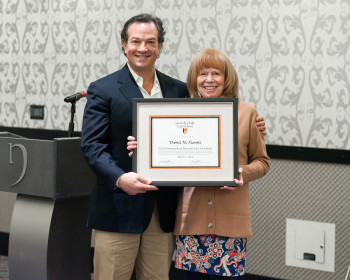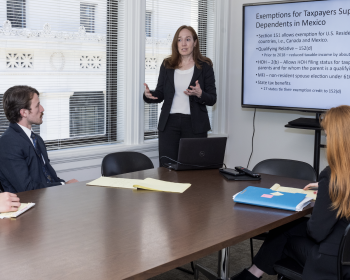CJRC Files Amicus Brief for COVID Related Release
Open gallery

Editors Note: This story has been updated as of June 9, 2020. See Related Content for additional court filings on behalf of additional individuals.
The Criminal Justice Reform Clinic at Lewis & Clark Law School (CJRC or Clinic) and the ACLU of Oregon filed an amicus brief on Friday in Curry County Circuit Court in the case of Danny Alcazar, 28, who is seeking release from prison while his case is on appeal. Alcazar is currently being held on a parole violation in Oregon State Correctional Institution in Salem.
Two Clinic students contributed and are named as Certified Law Students in the brief, Amber Cognata ’21 and Taylor Rose ’21. “This project was incredibly interesting because of how quickly it came together for such an urgent cause,” stated Rose. “It was an excellent learning experience about how the traditionally slow court system is oftentimes forced to address urgent matters,” she continued.
Cognata’s research focused specifically on the way prisons and jails in Oregon and across the U.S. are unable to comply with CDC guidelines for Coronavirus and how that is causing massive outbreaks among both inmates and employees in the prison system. “I researched specific stories from inmates in prisons in Oregon, such as individuals sleeping toe to head in dormitories of over 80 people and individuals who were showing symptoms being placed in solitary confinement,” Cognata stated. “I also wrote a section of the brief focusing on how a reduction of the prison population is the only effective way to keep inmates safe and provide enough space for proper social distancing and hygiene.”
The brief lays out the real dangers of COVID-19 in the prison environment. “Given ODOC’s admitted inability to implement social distancing measures, the spiking rates of infection among the limited number of people tested in Oregon prisons, the outbreaks already beginning in Oregon’s prisons, and ODOC’s failure to implement sufficient measures to protect from infection people who are particularly vulnerable to the virus’s most drastic outcomes, Mr. Alcazar’s health should be of utmost concern. Additionally, the other factors applicable to Mr. Alcazar’s case do not provide countervailing considerations that justify Oregon’s current violations of Mr. Alcazar’s constitutional rights.”
Alcazar’s appellate attorney argued that in addition to COVID-19 risks, Alcazar’s current sentence was imposed incorrectly when the court revoked his parole. The ACLU of Oregon and the CJRC are supporting Alcazar’s argument that he should not be kept in prison while he appeals the court’s error.
“None of Danny’s charges warranted a death sentence,” said Professor Aliza Kaplan, director of Lewis & Clark Law School’s Criminal Justice Reform Clinic. “Yet given COVID-19’s high fatality rate especially in congregate living environments like prisons where it is impossible for people to take the necessary precautions to protect themselves from the virus, his life will be at risk. Now is the time to consider alternative and safe arrangements for people like Danny before it is too late.”
Kaplan noted that this is one of several animus briefs that CJRC will be filing in the coming weeks, advocating for the release of specific individuals during the pandemic. CJRC and ACLU filed a brief in State v. Parker on June 8, 2020.
Law Communications is located in room 304 of Legal Research Center (LRC) on the law Campus.
MSC: 51
email jasbury@lclark.edu
voice 503-768-6605
Cell: 626-676-7923
Assistant Dean,
Communications and External Relations, Law School
Judy Asbury
Law Communications
Lewis & Clark Law School
10101 S. Terwilliger Boulevard MSC 51
Portland OR 97219

